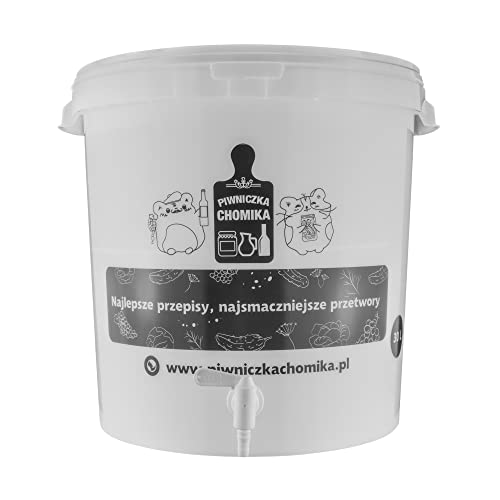Bertie Doe
Well-Known Member
As a guide, I used Graham Wheeler's Theakston Best Bitter for 19 litres, with a target OG of 1038. On cooling, just prior to pitching, I got an OG of 1028, oh dear 
The recipe: 3040g Pale malt, 175g Crystal malt, plus Challenger and Fuggle hops and Irish moss.
Equipment: 2 x 11 litre stock pots, 30 litre primary fermenter (tapped), 25 litre fermenter (tapped) converted to a mash tun, with s/s plate with 4mm holes, resting on a 110mm high s/s cake stand. Here's some pics:-
http://s222.photobucket.com/albums/dd22 ... c2099e.pbw
Method: I filled mash tun with 15 litres liquor at 80C and added malts. These sank rapidly, so just gave one 2 second stir with paddle. Took a temp reading of 77C, replaced lid, insulated mash tun, took a second reading after 90 mins and it had only dropped to 73C. This is a little hotter than Wheeler's suggested 66C:-
Q1. Will this higher temp affect sugar extraction/flavour or both?
Sparging: I cut a circle of aluminium turkey foil, punctured it with holes and placed this on top of the mash bed. I jugged 1 litre of hot water on top of the foil and released 1 litre of sweet wort into the primary fermenter. I repeated this step with a further 5 litres, then opened the mash tun tap fully and allowed the lot to flow into the fermenter. I noticed the jugged water went through the foil instantly and the sweet wort also drained very quickly through the tap.
Q2. Would fewer holes in the sparging foil and/or smaller than 4mm holes in mash plate, have improved sugar extraction? or should I have 'cracked' the tun tap slightly, thus slowing down the rate of wort extraction?
Q3. I relied on taste to determine if sparge extraction was successful. It tasted watery rather than sweet - is there another way of testing?
Boiling: The recipe suggests boiling for a full 90 mins-
Q4. Why is 90 minutes necessary?
Q5. I ended up with 20 litres of sweet wort (the recipe was for 19). How do I calculate this extra litre of dilution, will reduce the target SG?
If anyone can answer one or more of these questions, I would appreciate your help. Thanks Bertie
The recipe: 3040g Pale malt, 175g Crystal malt, plus Challenger and Fuggle hops and Irish moss.
Equipment: 2 x 11 litre stock pots, 30 litre primary fermenter (tapped), 25 litre fermenter (tapped) converted to a mash tun, with s/s plate with 4mm holes, resting on a 110mm high s/s cake stand. Here's some pics:-
http://s222.photobucket.com/albums/dd22 ... c2099e.pbw
Method: I filled mash tun with 15 litres liquor at 80C and added malts. These sank rapidly, so just gave one 2 second stir with paddle. Took a temp reading of 77C, replaced lid, insulated mash tun, took a second reading after 90 mins and it had only dropped to 73C. This is a little hotter than Wheeler's suggested 66C:-
Q1. Will this higher temp affect sugar extraction/flavour or both?
Sparging: I cut a circle of aluminium turkey foil, punctured it with holes and placed this on top of the mash bed. I jugged 1 litre of hot water on top of the foil and released 1 litre of sweet wort into the primary fermenter. I repeated this step with a further 5 litres, then opened the mash tun tap fully and allowed the lot to flow into the fermenter. I noticed the jugged water went through the foil instantly and the sweet wort also drained very quickly through the tap.
Q2. Would fewer holes in the sparging foil and/or smaller than 4mm holes in mash plate, have improved sugar extraction? or should I have 'cracked' the tun tap slightly, thus slowing down the rate of wort extraction?
Q3. I relied on taste to determine if sparge extraction was successful. It tasted watery rather than sweet - is there another way of testing?
Boiling: The recipe suggests boiling for a full 90 mins-
Q4. Why is 90 minutes necessary?
Q5. I ended up with 20 litres of sweet wort (the recipe was for 19). How do I calculate this extra litre of dilution, will reduce the target SG?
If anyone can answer one or more of these questions, I would appreciate your help. Thanks Bertie





























![BREWING THERMOMETER STICKERS ACCURATELY MONITOR FERMENTING BEER & WINE LIQUID TEMPERATURES 5PCS HOME BREW SPIRITS WINE LCD ADHESIVE [US]](https://m.media-amazon.com/images/I/311DDjo2X3L._SL500_.jpg)









